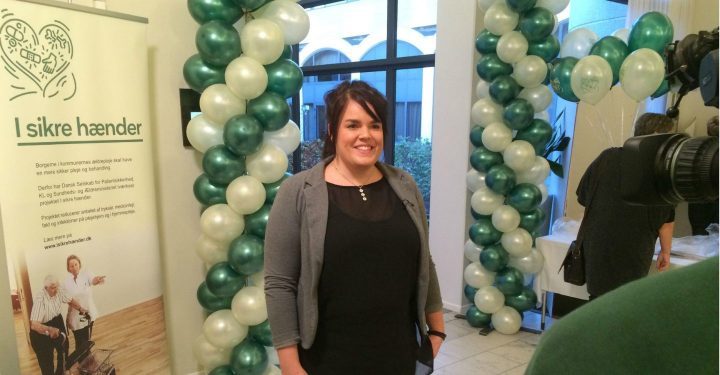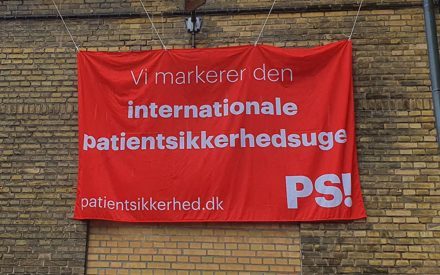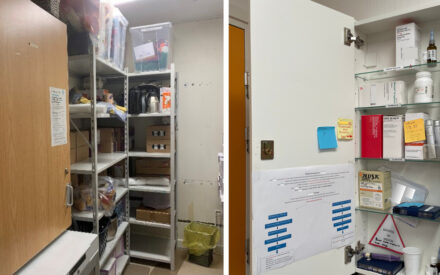When you celebrate the good results of improvement work, you create motivation for further improving. This is the message from a questionnaire survey among participants in the In Safe Hands project in elderly care, home care and nursing homes. These findings are in line with previous experiences from improvement programmes in hospitals.
Media coverage enhances professional pride
Communications as a catalyst (pdf)
Receiving positive cover in the media of one’s results is a factor giving motivation for additional improvements. The media in which participants prefer to be mentioned are the municipality’s own media, such as a website, newsletter, staff magazine or similar.
A total of 221 participants from the 18 municipalities involved in the In Safe Hands project responded in a questionnaire on the importance of communication initiatives. The survey was launched by the Danish Society for Patient Safety, PS!. The survey supports the view that active communication initiatives are important to the success of improvement projects. This is a point now attracting international focus in the network group #QiComms, which PS! took part in establishing.
“This new survey confirms the importance of an active communications strategy if you want to benefit as much as possible from improvement work. Communicative tools can be used with the deliberate purpose of enhancing motivation and the desire to improve,” says programme manager Tina Lynge, PS!.
Active communication within the In Safe Hands project
In Safe Hands was launched in 2013 in five municipalities; in 2016, it was broadened to cover a total of 18 municipalities. From the very start, In Safe Hands has had an active communication strategy, encouraging participants to demonstrate their good results by celebrating them and by making sure that methods and results received ongoing cover in internal and external media. The In Safe Hands website has helped pass on information about methods, events, tools and results. As a case in point, almost 250 news articles have been published on the In Safe Hands website since 2013, corresponding to about one per week over the last five years.
Consequently, a large proportion of the participants in the In Safe Hands project have gained experience with celebrations and with cover in articles and features in external and internal media.
Experience gained by the participants in the In Safe Hands project was collected in the summer of 2018 by means of a questionnaire forwarded via SurveyMonkey. The questionnaire was forwarded by e-mail to project managers in the 18 municipalities, and project managers were asked to forward the questionnaire internally in their organisation to participants in the In Safe Hands project. The number of respondents totalled 221 from the 18 municipalities. Just over half of the respondents are frontline healthcare professionals – registered nurses, social and healthcare assistants, social and healthcare workers, as well as therapists, while the remainder are managers or employed in a staff function. All 18 municipalities are represented in the replies received.
Celebrations bring more work enjoyment
76 % of respondents took part in celebrating a good result; a big majority among these agree (to a high extent or to some extent) that celebrations trigger a number of positive effects:
You get a sense that people notice the efforts you have made (97 %)
You get a feeling of togetherness and a feeling of working for the same cause (95 %)
You have more work enjoyment and want to work for continued improvements (94 %)
The prestige associated with improvement work increases (83 %)
Professional pride is enhanced (96 %)
Conversely, only 27 % agree (to a high extent or to some extent) that celebrations have no significance.
Positive effects of media cover
83 % of respondents have experienced positive cover in ’the media’ (including public media as well as websites, intranet, municipal newsletters, etc.). Among those respondents who experienced media cover, the far majority agree (to a high extent or to some extent) that such media cover has a number of positive effects:
You get a sense that people notice the efforts you have made (93 %)
You get a feeling of togetherness and a feeling of working for the same cause (93 %)
You have more work enjoyment and want to work for continued improvements (95 %)
The prestige associated with improvement work increases (89 %)
Professional pride is enhanced (93 %)
Only 20 % agree that media cover has no significance.
When you ask participants which media they prefer to be covered in, the internal municipal media, such as website, newsletter and staff magazine, have the highest score (80 %), followed by professional journals (63 %), the website for In Safe Hands (46 %),and local/regional newspapers (46 %).
In line with previous experience
The results of the questionnaire survey among participants in the improvement project at municipal nursing homes and in home care services are in line with the conclusions in a corresponding survey made previously among staff and managers at hospitals in the Danish Safer Hospital Programme in 2013. Replies back then also demonstrated that both celebrations and media cover act as drivers for improvement work, since they show recognition of the efforts made, strengthen togetherness in wards and increase work enjoyment.
Media coverage enhances professional pride
Furthermore, a previous survey carried out in 2015-2016 among the five pioneer municipalities in the In Safe Hands project showed similar results.
Communication tools are effective as drivers for improvement




